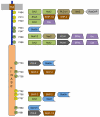Discoidin domain receptor functions in physiological and pathological conditions
- PMID: 24725424
- PMCID: PMC4021107
- DOI: 10.1016/B978-0-12-800180-6.00002-5
Discoidin domain receptor functions in physiological and pathological conditions
Abstract
The discoidin domain receptors, DDR1 and DDR2, are nonintegrin collagen receptors that are members of the receptor tyrosine kinase family. Both DDRs bind a number of different collagen types and play important roles in embryo development. Dysregulated DDR function is associated with progression of various human diseases, including fibrosis, arthritis, and cancer. By interacting with key components of the extracellular matrix and displaying distinct activation kinetics, the DDRs form a unique subfamily of receptor tyrosine kinases. DDR-facilitated cellular functions include cell migration, cell survival, proliferation, and differentiation, as well as remodeling of extracellular matrices. This review summarizes the current knowledge of DDR-ligand interactions, DDR-initiated signal pathways and the molecular mechanisms that regulate receptor function. Also discussed are the roles of DDRs in development and disease progression.
Keywords: Cell signaling; Cell–matrix interactions; Receptor activation; Receptor tyrosine kinase; Therapeutic target; Transmembrane collagen receptor.
© 2014 Elsevier Inc. All rights reserved.
Figures




References
-
- Abdulhussein R, McFadden C, Fuentes-Prior P, Vogel WF. Exploring the collagen-binding site of the DDR1 tyrosine kinase receptor. J Biol Chem. 2004;279:31462–31470. - PubMed
-
- Agarwal G, Kovac L, Radziejewski C, Samuelsson SJ. Binding of discoidin domain receptor 2 to collagen I: an atomic force microscopy investigation. Biochemistry. 2002;41:11091–11098. - PubMed
-
- Agarwal G, Mihai C, Iscru DF. Interaction of discoidin domain receptor 1 with collagen type 1. J Mol Biol. 2007;367:443–455. - PubMed
Publication types
MeSH terms
Substances
Grants and funding
LinkOut - more resources
Full Text Sources
Other Literature Sources
Medical
Molecular Biology Databases

